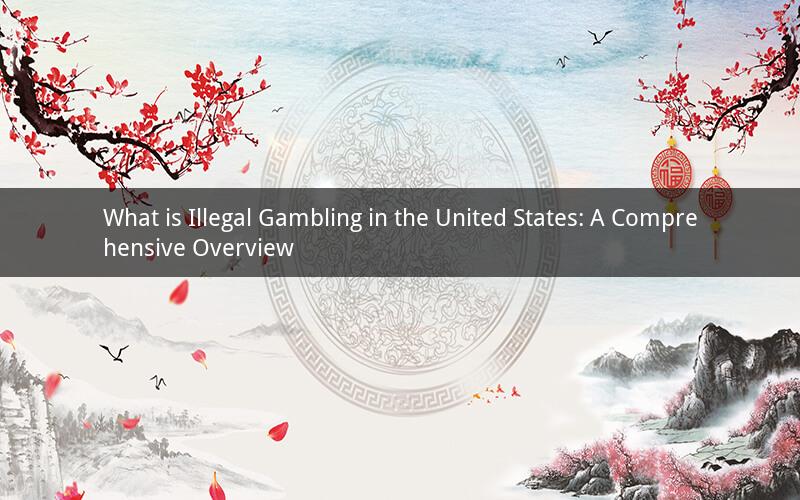
Introduction:
Illegal gambling has been a contentious issue in the United States for many years. Understanding what constitutes illegal gambling is crucial in addressing its implications and consequences. This article delves into the concept of illegal gambling in the United States, exploring its definition, types, legal implications, and efforts to combat it.
Definition of Illegal Gambling:
Illegal gambling refers to any form of gambling that is prohibited by state or federal laws. It encompasses activities such as betting on sports, playing casino games, participating in poker tournaments, and engaging in lottery games without proper licensing. The legality of gambling varies from state to state, with some allowing certain forms of gambling while others strictly prohibit it.
Types of Illegal Gambling:
1. Unlicensed Sports Betting: Betting on sports without a valid license is considered illegal. This includes placing bets through online platforms, mobile apps, or in-person at unregulated establishments.
2. Unlicensed Casino Games: Engaging in casino games such as poker, blackjack, roulette, or slot machines without a proper license is illegal. This applies to both physical casinos and online platforms offering unregulated games.
3. Unlicensed Poker Tournaments: Organizing or participating in poker tournaments without proper licensing is illegal. This includes both live tournaments and online poker platforms that lack the necessary permits.
4. Unregulated Lottery Games: Selling lottery tickets or participating in lottery games without proper authorization is illegal. This extends to both state-run lotteries and private lotteries conducted without government approval.
Legal Implications:
The legal implications of illegal gambling can vary depending on the severity of the offense and the jurisdiction. Penalties may include fines, imprisonment, and the seizure of gambling-related assets. Additionally, individuals involved in illegal gambling may face civil lawsuits or be banned from participating in legal gambling activities in the future.
Efforts to Combat Illegal Gambling:
Governments at both the state and federal levels have implemented measures to combat illegal gambling. Here are some of the key efforts:
1. Licensing and Regulation: Many states have established regulatory bodies to oversee gambling activities. These agencies issue licenses to operators and ensure compliance with legal requirements.
2. Law Enforcement: Law enforcement agencies, such as the FBI and state police departments, actively investigate and prosecute cases of illegal gambling. They collaborate with state regulatory bodies to identify and shut down illegal gambling operations.
3. Internet Filtering and Blocking: Governments have implemented measures to block access to illegal gambling websites. This includes filtering internet traffic and blocking access to specific URLs associated with illegal gambling activities.
4. Public Awareness Campaigns: Governments and organizations often conduct public awareness campaigns to educate individuals about the risks and consequences of illegal gambling. These campaigns aim to deter individuals from participating in illegal gambling activities.
Questions and Answers:
1. Q: What are the main reasons why gambling is illegal in some states?
A: The reasons for the legality of gambling vary among states, but common reasons include concerns about addiction, public safety, and the potential for corruption.
2. Q: Can individuals be charged with illegal gambling if they only participate in online gambling?
A: Yes, individuals can be charged with illegal gambling if they participate in online gambling activities without a valid license in their state. It is essential to check local laws and regulations before engaging in online gambling.
3. Q: Is it illegal to play poker with friends for money in the United States?
A: The legality of playing poker with friends for money depends on the state. Some states consider it a form of illegal gambling, while others may allow it if certain conditions are met, such as the number of players or the presence of a professional dealer.
4. Q: Can a state completely ban all forms of gambling within its borders?
A: Yes, a state has the authority to ban all forms of gambling within its borders. However, this often leads to a significant loss of revenue, as gambling generates substantial tax revenue for states that allow it.
5. Q: Is illegal gambling more prevalent in states with strict gambling laws?
A: While illegal gambling can occur in any state, it is often more prevalent in states with strict gambling laws. This is because individuals may seek alternative means to participate in gambling activities, leading to the growth of illegal gambling operations.
Conclusion:
Illegal gambling remains a significant issue in the United States, with varying legal implications and efforts to combat it. Understanding the definition, types, and consequences of illegal gambling is crucial in addressing this issue effectively. By implementing licensing and regulation, law enforcement, internet filtering, and public awareness campaigns, governments aim to reduce the prevalence of illegal gambling and protect individuals from its negative impacts.